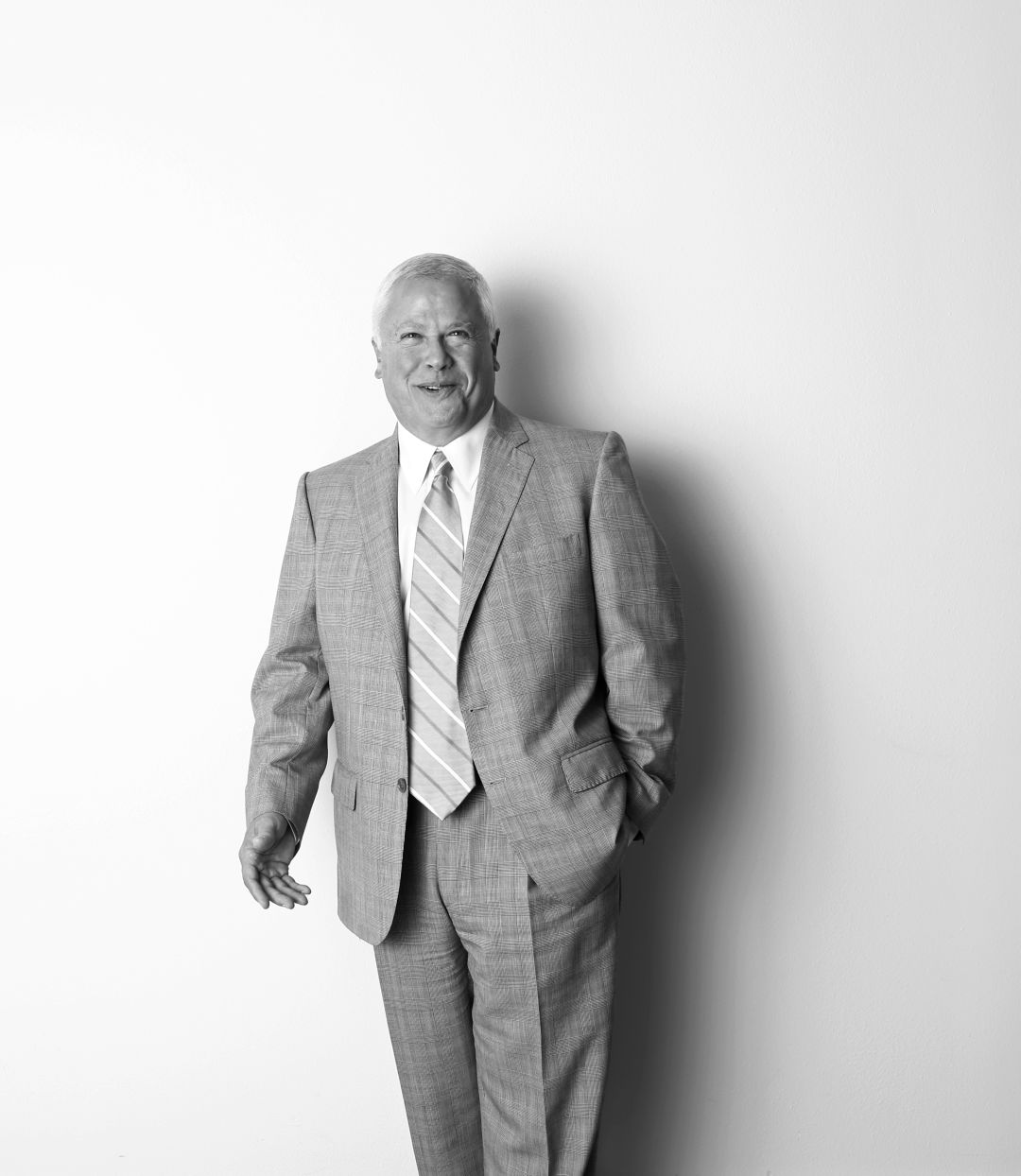Can Carlos Beruff Play the Business Card to Win Marco Rubio’s U.S. Senate Seat?
Carlos Beruff formally launched his campaign for U.S. Senate at a popular Miami bakery on Feb. 29. He was flanked by his attractive blonde wife, Janelle, and his two sons—one, 18, from a previous marriage, and the second, 3 years old. He and Janelle are expecting their third son this month.
His announcement that he was entering Florida’s high-profile race for the seat of failed Presidential candidate Marco Rubio came only five months before the primary. His opponents—most of them experienced in running for office—had been trying to build up name recognition, raise money and win endorsements for up to a year.
By contrast, Beruff, 58, has never run for office and is unknown to most Florida voters. A self-made man with an engaging, tough-guy personality who’s accustomed to calling the shots, he’s made his fortune as a Manatee County homebuilder and CEO of his own company, Medallion Home. He also brings along baggage from controversies that have dogged his business and service on state boards. But in a sign of just how potent Beruff’s candidacy is, the attacks against him began instantly.
Congressman Patrick Murphy, running for Rubio’s seat on the Democratic side, warned that Beruff is a far-right-wing Republican who supports Presidential candidate Donald Trump and would block President Obama’s nominees to the Supreme Court and cut funds for Planned Parenthood.
From his own party, Beruff was attacked by Congressman Ron DeSantis, also running for the seat. DeSantis’s campaign tied Beruff to former Florida governor and Republican-turned-Democrat Charlie Crist, berating Beruff as a “crony capitalist,” a “shady businessman” and not conservative enough to represent the Republican Party.
“I think it’s hilarious,” Beruff said in April from behind the polished granite desk at his Medallion Home headquarters in Bradenton. “I’m the hardworking Cuban kid and these career politicians are attacking me.”
And that, in a nutshell, is his campaign message. Beruff plans to stress his rags-to-riches story, likely to resonate with many voters, and his self-declared outsider status from politicians and the Washington establishment. Opponents may object to Beruff, who has close ties to Gov. Rick Scott and has served on major state boards, calling himself an outsider, but his business background and promises to cut government waste could be powerful assets in the Republican primary.
Florida is a huge state with more than 20 million people and a diverse electorate, from Cuban exiles to conservative retirees to younger service and construction workers feeling left behind. The state can sway the presidential election, and, with five toss-up Senate seats, it can also determine party control of Congress. The race for Rubio’s seat will capture national attention and outside dollars.
“Beruff is going to have to get a million people to vote for him. That’s tough,” says Tom Nolan, president of the Nolan Group, a Bradenton political consulting firm. “But a plus for Beruff is that nobody in the race has any [statewide] name recognition."
Also in his favor, Beruff has powerful friends, abundant confidence and is reported to have a personal war chest to help finance a campaign that could run into the tens of millions. Is it true about the war chest? “So they tell me,” he says with a grin. His friend and mentor, developer Pat Neal, says Beruff has the liquidity to finance his campaign, and the Sarasota Herald-Tribune reports a source close to Beruff saying he plans to spend at least $10 million. His campaign says his business interests are worth approximately $150 million to $200 million.
Beruff wouldn’t be the first politician to enter late and self-finance. Scott entered the governor’s race with less than five months to the 2010 primary and funded his campaign with $75 million of his own money, defeating Democrat Alex Sink by a little more than 1 percent. A super PAC, “Let’s Clean Up Washington,” was registered with the Federal Election Commission on March 1, less than two days after Beruff announced his candidacy. Financials for the PAC have not yet been disclosed.
“Spending money is going to be a lot of what this race is, buying name recognition,” says Nolan.
Beruff has already shown he’s an aggressive campaigner. In May, at a GOP meeting in St. Johns, Fla., Beruff called President Obama “an animal.” The remark received widespread coverage and was denounced by his Republican and Democratic opponents as offensive and even racist, but Beruff refused to apologize. He’s also hired the Washington, D.C.-based conservative political consulting firm, OnMessage Inc., the same team that steered Scott to victory in 2010.
In April, Beruff unleashed a series of TV spots with $1.5 million of his campaign money, the first major buy of any candidate in the race. His ads are filled with a swagger Trump could admire.
“I’m Carlos Beruff,” he starts out. “I’m not a politician. The experts want me to read a bunch of political crap off this teleprompter. Here’s what I have to say. Obama’s a disaster and Washington politicians are worthless. They waste our money, they make America weaker and they refuse to secure our border. It’s ridiculous. Let’s get rid of them. I’m Carlos Beruff. How about we take our country back and put America first?”
Despite calling himself “the hardworking Cuban kid,” Beruff was born in Miami in 1958. He grew up in South Florida and New York, the son of a Cuban refugee single mother who had been part of a failed attack in Cuba on Batista’s presidential palace before the Cuban Revolution. She escaped to the United States, returned to Cuba after the Revolution and, after becoming disillusioned with Castro, finally fled Cuba and communism for good in 1961. That same year, one of his uncles who had participated in the Bay of Pigs invasion was forced into a tractor-trailer with other detainees and suffocated by the Castro regime.
Beruff grew up poor, living for a time with a number of relatives in a converted carport while his mother worked at menial labor. He says his attitude towards life was shaped by his maternal grandmother, “Tita,” who cared for him while his mother was working.
“My grandmother told me you can do anything in this country as long as you work really hard,” Beruff says. “I’m old school because of her. If I shake your hand and say that something is going to happen, then that’s what's going to happen."
The young Beruff mowed lawns, delivered dry cleaning and sold fireworks. In 1970, when he was 12, his mother married Carlos Tepedino, a Cuban jeweler with alleged ties to both the CIA and the mob, and the family moved to New York. Tepedino raised Beruff as his own son, Beruff says. Beruff returned to Florida to attend a private boarding high school, Howey Academy near Orlando, now defunct, and Stetson University and the University of South Florida, but never earned a degree.
While living in Tampa in 1980, he answered a newspaper ad to sell real estate for U.S. Homes. He says he managed to make a sale on his first day on the job. Developer Neal remembers Beruff back then. “I ran into Carlos the first time when he was a sales professional at Bayshore Village, a property owned by U.S. Homes,” Neal says. “He was a young, squarely built man, dressed in a [flashily] tailored brown suit. He was not the typical guy you’d see in Bayshore Gardens. He looked like a guy who landed here from Miami. It could have been off-putting, but as soon as he opened his mouth you knew you were going to like him, and I knew I wanted to keep track of him.” The two are close today. Neal calls Beruff, “the most engaging, relating individual I’ve ever known in my life,” someone with “the best people skills of anyone I’ve done business with.”
In 1982, when Beruff was just 24, he incorporated Banner Home Corp., a homebuilding company, with partner Ken Keating. Tepedino cosigned on the $120,000 loan that began his stepson’s first real foray into real estate development, his purchase of 22 lots near Tallevast Road and Tuttle Avenue. Beruff says he paid the loan back in eight months.
By 1984, Beruff, now 26, had also founded Medallion, slowly growing his companies and barely avoiding bankruptcy with Banner in the savings and loan crisis of the early ’90s. (Banner no longer operates.) His experiences as a young Florida businessman inform his conservative political platform of small government.
“When I did my first subdivision in 1985-86,” Beruff says, “I did 20 acres with 107 homes. That whole permitting process was about $25,000 then. Today, the same process is $250,000. It’s a tenfold increase and all of that increase is due to government regulation.”
Blaming government regulations for all problems is conservative Republican stock-in-trade, and Beruff definitely has a penchant for such sweeping statements. A month into the campaign he’d already flunked one of Politifact’s fact-checking tests for his comments about the Iran nuclear deal. But however much opponents might challenge some of his political declarations, there is no question that Beruff is an experienced, successful entrepreneur, one of the largest homebuilders in Southwest Florida. Since that first subdivision, he has built roughly 2,500 homes in Southwest Florida under his Medallion brand, and his company employs 70 and reported more than $83 million in revenues in 2015. Today he is building or has plans to build homes and communities from Anna Maria Island to Casey Key in Sarasota and Manatee counties.
Beruff’s business has hit some speed bumps along the way. Medallion used illness-inducing Chinese drywall in six homes about 10 years ago. In a class-action suit, thousands of homeowners from multiple states sued various homebuilders, including Medallion, who had used the drywall. The Medallion homeowners were told by a company attorney in 2010 that Medallion would go bankrupt if it had to pay for repairs, even though at the time Medallion was spending millions to purchase land. Medallion was ultimately ordered to offer remediation. And during the recession, companies Beruff co-managed defaulted on $40 million in multiple loans, contributing to the failure of Orion Bank, according to the Herald-Tribune.
But he also made some canny moves during the recession. Over an 18-month period before the housing market collapsed Medallion unloaded about 90 percent of its holdings, getting out almost at the top of the market, then later bought large tracts of other land at fire sale prices.
He was less successful with another real estate effort. In 2013, Beruff and partner Larry Lieberman announced plans to develop Long Bar Pointe, a 3,600-home community with a 300-slip marina, hotel and conference center on 500 acres along Sarasota Bay in southwest Manatee County. Such intense shoreline development is prohibited by Manatee’s comprehensive plan, and the project required a commission hearing and rezoning. Environmental groups and citizens created an organization, Save Our Bay, to fight the project, and more than 1,000 people, many vocal in their opposition, attended a 12-hour Manatee County Commission hearing. The commissioners did not approve the marina and a planned channel, and Beruff and Lieberman responded by suing the county for $18 million. In January, a judge ruled in the county’s favor. The developers are appealing the decision.

Image: Salvatore Brancifort
Beruff has deep connections to prominent Florida Republicans. Since the early 2000s, according to the Tampa Bay Times and Miami Herald, Beruff and his 20-plus LLCs have given more than $1 million to PACs, the Republican party, and local, state and national candidates. Among those he gave to were then-Republican Charlie Crist, Gov. Rick Scott, Jeb Bush, Vern Buchanan and Miami’s Carlos Curbelo, elected to Congress in 2014.
In 2008, Crist appointed Beruff to the State College of Florida Manatee-Sarasota governing board, the Southwest Florida Water Management District Board (Swiftmud, which oversees and protects water in 16 counties) and the Sarasota-Manatee Airport Authority Board. After Scott was elected, Beruff served on his transition team.
Scott reappointed Beruff to all three governing boards. In 2016, Scott, who was smarting from the outcry about his refusal to support Medicaid funding in Florida and, as a former executive in for-profit hospitals, had long been a critic of public hospitals, formed the Commission on Health Care and Hospital Funding to investigate the funding of the state’s taxpayer-supported hospitals. The governor named Beruff chair, despite a chorus of complaints that Beruff had no experience in medicine or hospital finance.
At Swiftmud and SCF, Beruff made a name for himself by scrutinizing and cutting budgets and sticking to conservative, pro-business positions, despite sometimes withering criticism.
At Swiftmud, he slashed budgets and staff, declaring the agency was bloated and had unreasonably large cash reserves. Critics charged the cuts reduced the agency’s ability to manage and protect Florida’s most important resource. “Carlos Beruff is not a friend of the public interest,” says Glenn Compton, chair of ManaSota 88. “He is more concerned with economic development over the environment every single time.”
In 2015, Beruff, along with nine other Swiftmud directors, voted to approve a Pat Neal project called Harbor Sound on Anna Maria’s Perico Island. Neal wanted to build a family compound on a 3.5-acre parcel, which included about an acre of wetlands. Beruff resigned from the board the following day. His vote was decried by environmentalists as a personal favor to Neal, and environmental groups sued, alleging the agency ignored its own environmental directives to grant the permit. Mediation failed, and at press time, the case seemed headed for court.
In 2012, as board chair of State College of Florida, Beruff stirred up community controversy when he ousted president Lars Hafner. Beruff had clashed with Hafner, a former Democratic state legislator who was accused of extravagance when he tried to use school funds to purchase a $70,000 Cadillac Escalade. Beruff spent $9,000 of his own money to hire an attorney to see what he could dig up on the college president. Beruff’s investigation revealed that Hafner had signed the name of SCF’s former board chair, Steven Harner, on a grant application. Although Harner said he had given Hafner permission to sign the document and Hafner was cleared of wrongdoing, he eventually agreed to resign. Two board members resigned in protest, and another, who had questioned some of Beruff’s decisions, was not reappointed by the governor.
(The irony was not lost on some of Beruff´s detractors this spring, when it was revealed that Beruff’s 2004 voter registration form in Manatee County erroneously stated he was born in Cuba rather than Miami. Beruff, who signed the form, said “my assistant” must have filled it out incorrectly; “that is not my writing at all.”)
Three years later, in 2015, Beruff spearheaded the elimination of tenure at SCF, persisting through student protests, critical editorials in local newspapers and a 118 out of 120 no-confidence vote against the decision on the part of SCF faculty.
“It was not very popular,” Beruff says. “Some people hate me for that, but I’m OK with it. It wasn’t meant to hurt people who were doing their jobs. It was the only way we were going to fix academia because we couldn't continue to spend money for tenured professors who weren’t doing their jobs.”
“What failure was he fixing?” asks former Democratic state representative and New College political science professor Keith Fitzgerald. “We had talented people who could make a lot of money in the job market [choosing] to make $60,000 teaching at the community college. Now it’s going to be a lot harder to recruit people to teach chemistry at State College. He says [cutting tenure] is a success because he shoved it down people’s throats, but Beruff’s record at SCF will turn out to be a disaster.”
Beruff shrugs off such criticism, saying he used his budgetary and business experience to make the college accountable and cut needless spending. For example, he derailed the $42 million new SCF library by arguing that students no longer needed such a large facility. In its place is a $17-million building.
Beruff has affirmed his support for Trump’s proposed wall on the Mexican border, and has extended the New York billionaire’s threat to close the United States to Muslims, saying he wouldn’t allow anyone from the Middle East, with the exception of Israelis, to enter the country. So far, he seems to be avoiding alienating Spanish-speaking voters; a Spanish-language ad running in the Miami area makes no mention of immigration reform, unlike his English-language ads, which accuse President Obama of failing to secure the nation’s borders.
Beruff’s website says he is pro-life and pro-Second Amendment, but he has not yet spoken out on these hot-button social issues. Instead, he highlights his outsider appeal as a successful businessman and concerned citizen who is getting into politics because he wants to serve. “The politicians running against me are all worried about what their next step up the ladder is,” says Beruff. “I am in the position that I have taken care of the people most important to me. When you have accomplished that, the next most important thing for you to do is to serve the country.”
A recent poll of Republican activists shows Beruff’s message and money may be working. He is leading his Republicans rivals. “Never lose sight of your goal,” he says. “Never lose sight of where you want to get.”



